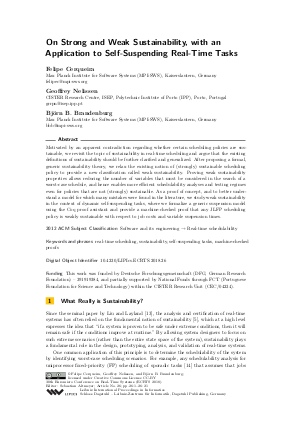On Strong and Weak Sustainability, with an Application to Self-Suspending Real-Time Tasks
Authors Felipe Cerqueira, Geoffrey Nelissen, Björn B. Brandenburg
-
Part of:
Volume:
30th Euromicro Conference on Real-Time Systems (ECRTS 2018)
Part of: Series: Leibniz International Proceedings in Informatics (LIPIcs)
Part of: Conference: Euromicro Conference on Real-Time Systems (ECRTS) - License:
 Creative Commons Attribution 3.0 Unported license
Creative Commons Attribution 3.0 Unported license
- Publication Date: 2018-06-22
File

PDF
LIPIcs.ECRTS.2018.26.pdf
- Filesize: 0.87 MB
- 21 pages
Document Identifiers
Subject Classification
ACM Subject Classification
- Software and its engineering → Real-time schedulability
Keywords
- real-time scheduling
- sustainability
- self-suspending tasks
- machine-checked proofs
Metrics
- Access Statistics
-
Total Accesses (updated on a weekly basis)
0PDF Downloads0Metadata Views
Abstract
Motivated by an apparent contradiction regarding whether certain scheduling policies are sustainable, we revisit the topic of sustainability in real-time scheduling and argue that the existing definitions of sustainability should be further clarified and generalized. After proposing a formal, generic sustainability theory, we relax the existing notion of (strongly) sustainable scheduling policy to provide a new classification called weak sustainability. Proving weak sustainability properties allows reducing the number of variables that must be considered in the search of a worst-case schedule, and hence enables more efficient schedulability analyses and testing regimes even for policies that are not (strongly) sustainable. As a proof of concept, and to better understand a model for which many mistakes were found in the literature, we study weak sustainability in the context of dynamic self-suspending tasks, where we formalize a generic suspension model using the Coq proof assistant and provide a machine-checked proof that any JLFP scheduling policy is weakly sustainable with respect to job costs and variable suspension times.
Cite As Get BibTex
Felipe Cerqueira, Geoffrey Nelissen, and Björn B. Brandenburg. On Strong and Weak Sustainability, with an Application to Self-Suspending Real-Time Tasks. In 30th Euromicro Conference on Real-Time Systems (ECRTS 2018). Leibniz International Proceedings in Informatics (LIPIcs), Volume 106, pp. 26:1-26:21, Schloss Dagstuhl – Leibniz-Zentrum für Informatik (2018)
https://doi.org/10.4230/LIPIcs.ECRTS.2018.26
BibTex
@InProceedings{cerqueira_et_al:LIPIcs.ECRTS.2018.26,
author = {Cerqueira, Felipe and Nelissen, Geoffrey and Brandenburg, Bj\"{o}rn B.},
title = {{On Strong and Weak Sustainability, with an Application to Self-Suspending Real-Time Tasks}},
booktitle = {30th Euromicro Conference on Real-Time Systems (ECRTS 2018)},
pages = {26:1--26:21},
series = {Leibniz International Proceedings in Informatics (LIPIcs)},
ISBN = {978-3-95977-075-0},
ISSN = {1868-8969},
year = {2018},
volume = {106},
editor = {Altmeyer, Sebastian},
publisher = {Schloss Dagstuhl -- Leibniz-Zentrum f{\"u}r Informatik},
address = {Dagstuhl, Germany},
URL = {https://drops.dagstuhl.de/entities/document/10.4230/LIPIcs.ECRTS.2018.26},
URN = {urn:nbn:de:0030-drops-89773},
doi = {10.4230/LIPIcs.ECRTS.2018.26},
annote = {Keywords: real-time scheduling, sustainability, self-suspending tasks, machine-checked proofs}
}
Author Details
- CISTER Research Centre, ISEP, Polytechnic Institute of Porto (IPP), Porto, Portugal
Funding
This work was funded by Deutsche Forschungsgemeinschaft (DFG, German Research Foundation) - 391919384, and partially supported by National Funds through FCT (Portuguese Foundation for Science and Technology) within the CISTER Research Unit (CEC/04234).
References
-
Yasmina Abdeddaïm and Damien Masson. The scheduling problem of self-suspending periodic real-time tasks. In Proceedings of the 20th International Conference on Real-Time and Network Systems, RTNS'12, pages 211-220, 2012.

-
Theodore P. Baker and Sanjoy K. Baruah. Sustainable multiprocessor scheduling of sporadic task systems. In Proceedings of the 21st Euromicro Conference on Real-Time Systems, ECRTS '09, pages 141-150, 2009.

-
Sanjoy Baruah. Scheduling periodic tasks on uniform multiprocessors. Information Processing Letters, 80(2):97-104, 2001.

-
Sanjoy Baruah. Feasibility analysis of preemptive real-time systems upon heterogeneous multiprocessor platforms. In Proceedings of the 25th Real-Time Systems Symposium, RTSS'04, pages 37-46. IEEE, 2004.

-
Sanjoy Baruah and Alan Burns. Sustainable scheduling analysis. In Proceedings of the 27th Real-Time Systems Symposium, RTSS'06, pages 159-168. IEEE, 2006.

-
Alan Burns and Sanjoy Baruah. Sustainability in real-time scheduling. Journal of Computing Science and Engineering, 2(1):74-97, 2008.

-
Felipe Cerqueira, Felix Stutz, and Björn B Brandenburg. PROSA: A case for readable mechanized schedulability analysis. In Proceedings of the 28th Euromicro Conference on Real-Time Systems, ECRTS'16, pages 273-284. IEEE, 2016.

-
Jian-Jia Chen, Geoffrey Nelissen, Wen-Hung Huang, Maolin Yang, Björn Brandenburg, Konstantinos Bletsas, Cong Liu, Pascal Richard, Frédéric Ridouard, Neil Audsley, Raj Rajkumar, and Dionisio de Niz. Many suspensions, many problems: A review of self-suspending tasks in real-time systems. Technical Report 854, Department of Computer Science, TU Dortmund, 2016.

-
Sudarshan K. Dhall and C. L. Liu. On a real-time scheduling problem. Operations Research, 26(1):127-140, 1978.

-
Rhan Ha. Validating Timing Constraints in Multiprocessor and Distributed Systems. PhD thesis, University of Illinois at Urbana-Champaign, 1995.

-
Rhan Ha and Jane WS Liu. Validating timing constraints in multiprocessor and distributed real-time systems. In Proceedings of the 14th International Conference on Distributed Computing Systems, ICDCS'94, pages 162-171. IEEE, 1994.

-
In-Guk Kim, Kyung-Hee Choi, Seung-Kyu Park, Dong-Yoon Kim, and Man-Pyo Hong. Real-time scheduling of tasks that contain the external blocking intervals. In Proceedings of the 2nd International Workshop on Real-Time Computing Systems and Applications, RTCSA'95, pages 54-59. IEEE, 1995.

-
Chung Laung Liu and James W Layland. Scheduling algorithms for multiprogramming in a hard-real-time environment. Journal of the ACM, 20(1):46-61, 1973.

-
Aloysius Ka-Lau Mok. Fundamental design problems of distributed systems for the hard-real-time environment. PhD thesis, Massachusetts Institute of Technology, 1983.

- \prosa - Weak Sustainability. Supplemental material and formal proofs, URL: http://prosa.mpi-sws.org/releases/sustainability.
-
Ragunathan Rajkumar. Dealing with suspending periodic tasks. IBM Thomas J. Watson Research Center, 1991.

-
Dongkun Shin and Jihong Kim. A profile-based energy-efficient intra-task voltage scheduling algorithm for hard real-time applications. In Proceedings of the 2001 International Symposium on Low Power Electronics and Design, pages 271-274. ACM/IEEE, 2001.

